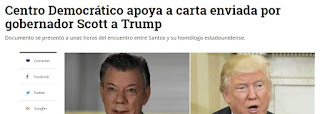 |
| Erradicating Colombian coca bushes. Less supply increases prices, triggering more plantations elsewhere. |
Colombia's coca leaf crop has more than doubled, reaching record levels.
Conservative politicians and commentators, such as Florida Governor Rick Scott, ex-U.S. ambassador to the OEA Roger Noriega, and a certain right-wing Wall Street Journal columnist, want Colombia to accelerate coca leaf erradication, and in particular restart aerial fumigation with glyphosate.
 |
| Coca leaf acreage has spiked in recent years. (Graphic from Semana magazine.) |
But even in the best of scenarios, attacking drug crops is a losing strategy. According to analysts, coca leaf farmers receive barely more than 1% of drug trafficking's profits, meaning that destroying those crops produces little economic impact on the drug economy. Even more importantly, by reducing supply, drug crop erradication raises prices and increases the economic incentive to plant coca. As a result, when they erradicate one farmer's crop, he or another farmer will likely respond by planting someplace else.
Also, drug traffickers' profits rise. Narcos say: 'Thank you Donald Trump!
 |
| Florida state Governor Rick Scott send Trump a letter criticizing Colombian for failing to erradicate its coca leaf crop. |
On the other hand, reducing demand, for example by treating addicts, lowers prices and reduces the economic incentive to plant coca. Yet, Trump has proposed cutting the budget of the Office of National Drug Control Policy by 95%.
Naturally, decriminalizing drugs would reduce many of their negative impacts, but that's not on Washington's policy radar screen.
Afterthought: Santos and Trump also likely agreed to condemn the Venezuelan government for its increasing authoritarianism and many human rights violations. Good enough. So, how does Trump square that with his friendship with Turkish Pres. Erdogan, who is becoming increasingly authoritarian and violates human rights?
By Mike Ceaser, of Bogotá Bike Tours




No comments:
Post a Comment